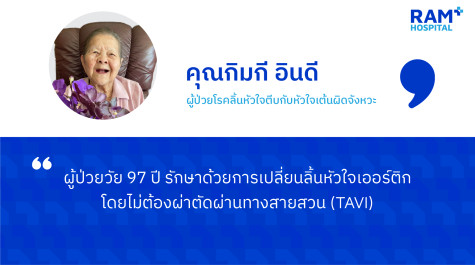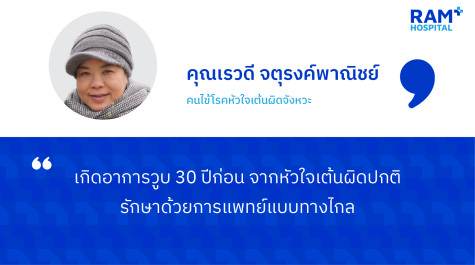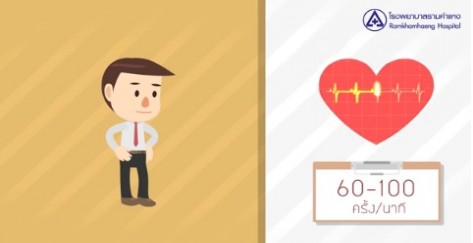Arrhythmia Department
Centers and Programs
We provide diagnosis and treatment services for all types of cardiac arrhythmias and electrocardiogram patients. A group of doctors who specialize in the treatment of electrical heart Electrocardiogram laboratory equipped with advanced medical equipment and technology, analyzing the cause and treating the heart's electrical system with the CARTO (CARTO System), a technology that can display a virtual image. To see the location of the anomaly, This improves the accuracy of diagnosis and treatment, resulting in better treatment effectiveness and reduced patient outcomes.
Cardiac Arrhythmia Department Services
1. Cardiac Electrophysiological Diagnosis
Cardiac Electrophysiological Diagnosis is an examination of the electrical signals and the heart's electrical path. To diagnose the cause and location of the abnormal electrical system in the heart, resulting in an irregular heartbeat. The results are displayed in 2D graphs. Help doctors determine suitable treatment options. In this way, If the doctor considers Electro Physiologic Study and Radiofrequency ablation. The treatment can be continued immediately after the electrophysiological diagnosis of the heart.
2. Electrophysiology Study and Radiofrequency
Electrophysiology study and radiofrequency ablation of abnormal heartbeats by high-frequency radio waves is to use a catheter through the blood vessels and into the chambers of the heart. At the end of the cable, there is an electrode that emits radio energy at the location of the abnormal electrical current to destroy the abnormal conductivity.
3. Radiofrequency Ablation with the CARTO system
Radiofrequency Ablation with the CARTO system relying on the fault locator, the electrical system of the heart (CARTO System). It is a treatment by locates abnormalities of the electrocardiogram, which can be displayed in real-time 3D images. This method can be used to treat a wide range of abnormal heart electrical disorders, such as :
- Irregular heartbeat of the upper chambers (atrial tachycardia)
- Quivering heartbeat of the upper chambers (atrial fibrillation)
- Rapid heartbeat of the lower chambers (ventricular tachycardia)
- Rapid heartbeat of the upper chambers (supraventricular tachycardia)
4. Pacemaker
A Pacemaker is a small electronic device to help regulate the heart rhythm. The pacemaker is placed under the skin near the collarbone with a lead extending from the device to the heart. The lead allows the device to control and increase the heart rate. It is used to treat a slow heart rate.
5. Implantable Cardioverter Defibrillator (ICD)
An Implantable Cardioverter Defibrillator (ICD) is similar to a pacemaker. The ICD is implanted under the skin with a lead extending from the device to the heart. If the device detects a rhythm that is too slow, it will stimulate the heartbeat. When the heart beats too quickly and the patient’s life is threatened, the ICD will restore a normal heart rate to save the patient’s life.
6. Cardiac Resynchronization Therapy (CRT)
Cardiac Resynchronization Therapy (CRT) is similar to the implantation of a pacemaker or ICD. A cardiac resynchronization device is implanted under the skin to treat chronic heart failure when drug treatment has proven ineffective. The implanted device enables the heart muscle to function properly.
Laboratory medical equipment and instruments
The Cardiac arrhythmia department, Ramkhamhaeng hospital is well-equipped with the most advanced medical equipment and technology for the diagnosis and treatment of arrhythmia (irregular heartbeat), including the following equipment :
- The CARTO system is a computer-aided technology that creates 3-dimensional images of cardiac structures and electrical signals. Areas are color-coded according to the electrogram voltage. By creating a variety of specific images, the system enables doctors to identify the exact location of abnormalities and choose the most appropriate treatment. Using the CARTO system, doctors can provide highly effective treatment by applying radiofrequency waves at the precise location of the heart where the abnormality is present.
- CARTOSOUND is an ultrasound image system that uses software to create 3-dimensional graphic images. Cartosound enhances the doctors’ ability to see cardiac structures and locate abnormalities.
- Computer X-ray
- A mapping system that operates on similar principles to GPS promotes accurate diagnosis and treatment. Various software applications , such as CFAEs (complex fractionated atrial electrocardiograms), are available to generate more specific images according to the different types of abnormalities experienced by each patient.
Customer Testimonial
Grandma Kimkee Inde

Customer Testimonial
Khun Rawadee Jaturongpanich

Patient with Arrhythmia
Experienced fainting 30 years ago due to abnormal heart rhythm; treated via telemedicine.
"...It happened when I was about 30. Initially, I just felt numbness at the base of my tongue and jaw. My heart would flutter, and I'd faint. I first went to Ramkhamhaeng Hospital, but they found nothing because I had no symptoms at the time, and the doctor thought it was just a regular faint. Then one day, I was riding on the back of a motorcycle in the village when I fainted and fell off. A neighbor saw it and took me to Ramkhamhaeng Hospital, where I met Dr. Wichai. He was suspicious because I was so young to have such symptoms. After a heart check-up, he had me wear a Holter monitor, which showed an abnormal heart rhythm. The doctor immediately called me back to the hospital for medication. After that, I improved and was told to take the medication daily. The doctor had initially said I might need to take medication for life to control my heart rate. After that, I fainted two or three more times, went back to the doctor, and received intravenous medication. I wondered what caused it, and the doctor explained that stress could be a factor. I thought that was probably it, as I had work problems and many other issues simultaneously. So, I decided to change my lifestyle, trying to eliminate all problems to avoid dwelling on them, and started exercising until I felt better. When I had no more fainting spells, I tried stopping the medication... I stopped for over 20 years and was fine, so I never saw a doctor again. I lived a normal life with no warning signs whatsoever. Then, suddenly, on February 28th, in the afternoon, I was walking in my room and just collapsed without any warning. Luckily, it was only for a moment. When I got up, I remembered my old symptoms. But after sitting all day, nothing else happened. Then, in the early evening, while leaning back watching TV, I felt faint and my heart pounded, and then I fainted repeatedly. I knew this was very unusual, much worse than before – I felt exhausted from the repeated fainting. So, I called an ambulance to take me to Ramkhamhaeng Hospital, knowing Dr. Wichai was still there, even after all these years. Although my medical records weren't there anymore, the doctor remembered me fainting and falling off the motorcycle. Dr. Wichai, along with Dr. Buncha, worked together to examine and treat me from that day on. They put a Holter monitor on me, but I didn't experience any symptoms..."
Customer Testimonial
Khun Piya Pasutan

“After I had defibrillation implant surgery two years ago, I thought the severe symptoms from arrhythmia would be over. Able to travel abroad normally without worrying that symptoms will recur and possibly death at any time. But suddenly, an unexpected incident happened. When I have a heart disease that has arisen without knowing the cause !!
.
So I decided to come here. Upon examination, the heart was found to lack potassium. At first, the doctor prescribed potassium supplements. But it was never cured. Finally, the doctor recommends the treatment of electrolysis technology. Listening to it should help things get better. So I decided to do it."
Doctors have to tell you that this method is quite complex and can take a long time. The doctor doing the treatment must have great expertise, and the equipment must be ready. Because if an error occurs, the patient's heart can be damaged and die. For Mr. Piya, it takes up to 7 hours for the surgery by electrocautery. It can be treated in 2 large areas. And there are still 2 small points that cannot be operated on by electrocautery immediately. The doctor then considered the treatment for 2 points later.
After the surgery, Mr. Piya was able to live the same life. Because he follows the instructions strictly. With medication regularly. Reduce your stress from work. Get enough exercise and rest. Severe arrhythmias do not recur. Even if you have to travel abroad for 15 hours, symptoms will still be fine. We are glad to be a part of Piya's recovery from the symptoms. Make his life safer and more comfortable.
Customer Testimonial
Khun Srisawat Kalaya

Former Arrhythmia Patient: Srisawat Kalaya's Story
Srisawat Kalaya visited the doctor experiencing "cardiac arrhythmia," or an abnormally fast heartbeat. He described the initial phase of his condition, which involved chest pain and easy fatigue. He sought medical attention, received medication, and felt better for a while. However, his symptoms would return intermittently, eventually becoming more frequent and prolonged, significantly impacting his daily life. There were times his heart would pound continuously from 8 AM to 2 PM. This led him to revisit his previous hospital, where doctors recommended radiofrequency ablation to treat the heart muscle.
Choosing Ramkhamhaeng Hospital for Treatment
When serious treatment became necessary, Srisawat and his family decided to transfer to Ramkhamhaeng Hospital. They were confident in the medical team's expertise and the hospital's advanced equipment. After a thorough re-diagnosis, the doctor recommended a treatment plan, and Srisawat chose to undergo catheter ablation to target the abnormal electrical impulses in his heart.
Swift Recovery and Normal Heart Rhythm
Srisawat's recovery was remarkably quick; he stayed at the hospital for only one night and was discharged the following morning. A week later, he had a follow-up appointment, and tests confirmed his heartbeat had returned to normal.
Customer Testimonial
Grandma Kimkee Inde

Customer Testimonial
Khun Rawadee Jaturongpanich

Patient with Arrhythmia
Experienced fainting 30 years ago due to abnormal heart rhythm; treated via telemedicine.
"...It happened when I was about 30. Initially, I just felt numbness at the base of my tongue and jaw. My heart would flutter, and I'd faint. I first went to Ramkhamhaeng Hospital, but they found nothing because I had no symptoms at the time, and the doctor thought it was just a regular faint. Then one day, I was riding on the back of a motorcycle in the village when I fainted and fell off. A neighbor saw it and took me to Ramkhamhaeng Hospital, where I met Dr. Wichai. He was suspicious because I was so young to have such symptoms. After a heart check-up, he had me wear a Holter monitor, which showed an abnormal heart rhythm. The doctor immediately called me back to the hospital for medication. After that, I improved and was told to take the medication daily. The doctor had initially said I might need to take medication for life to control my heart rate. After that, I fainted two or three more times, went back to the doctor, and received intravenous medication. I wondered what caused it, and the doctor explained that stress could be a factor. I thought that was probably it, as I had work problems and many other issues simultaneously. So, I decided to change my lifestyle, trying to eliminate all problems to avoid dwelling on them, and started exercising until I felt better. When I had no more fainting spells, I tried stopping the medication... I stopped for over 20 years and was fine, so I never saw a doctor again. I lived a normal life with no warning signs whatsoever. Then, suddenly, on February 28th, in the afternoon, I was walking in my room and just collapsed without any warning. Luckily, it was only for a moment. When I got up, I remembered my old symptoms. But after sitting all day, nothing else happened. Then, in the early evening, while leaning back watching TV, I felt faint and my heart pounded, and then I fainted repeatedly. I knew this was very unusual, much worse than before – I felt exhausted from the repeated fainting. So, I called an ambulance to take me to Ramkhamhaeng Hospital, knowing Dr. Wichai was still there, even after all these years. Although my medical records weren't there anymore, the doctor remembered me fainting and falling off the motorcycle. Dr. Wichai, along with Dr. Buncha, worked together to examine and treat me from that day on. They put a Holter monitor on me, but I didn't experience any symptoms..."
Customer Testimonial
Khun Piya Pasutan

“After I had defibrillation implant surgery two years ago, I thought the severe symptoms from arrhythmia would be over. Able to travel abroad normally without worrying that symptoms will recur and possibly death at any time. But suddenly, an unexpected incident happened. When I have a heart disease that has arisen without knowing the cause !!
.
So I decided to come here. Upon examination, the heart was found to lack potassium. At first, the doctor prescribed potassium supplements. But it was never cured. Finally, the doctor recommends the treatment of electrolysis technology. Listening to it should help things get better. So I decided to do it."
Doctors have to tell you that this method is quite complex and can take a long time. The doctor doing the treatment must have great expertise, and the equipment must be ready. Because if an error occurs, the patient's heart can be damaged and die. For Mr. Piya, it takes up to 7 hours for the surgery by electrocautery. It can be treated in 2 large areas. And there are still 2 small points that cannot be operated on by electrocautery immediately. The doctor then considered the treatment for 2 points later.
After the surgery, Mr. Piya was able to live the same life. Because he follows the instructions strictly. With medication regularly. Reduce your stress from work. Get enough exercise and rest. Severe arrhythmias do not recur. Even if you have to travel abroad for 15 hours, symptoms will still be fine. We are glad to be a part of Piya's recovery from the symptoms. Make his life safer and more comfortable.
Customer Testimonial
Khun Srisawat Kalaya

Former Arrhythmia Patient: Srisawat Kalaya's Story
Srisawat Kalaya visited the doctor experiencing "cardiac arrhythmia," or an abnormally fast heartbeat. He described the initial phase of his condition, which involved chest pain and easy fatigue. He sought medical attention, received medication, and felt better for a while. However, his symptoms would return intermittently, eventually becoming more frequent and prolonged, significantly impacting his daily life. There were times his heart would pound continuously from 8 AM to 2 PM. This led him to revisit his previous hospital, where doctors recommended radiofrequency ablation to treat the heart muscle.
Choosing Ramkhamhaeng Hospital for Treatment
When serious treatment became necessary, Srisawat and his family decided to transfer to Ramkhamhaeng Hospital. They were confident in the medical team's expertise and the hospital's advanced equipment. After a thorough re-diagnosis, the doctor recommended a treatment plan, and Srisawat chose to undergo catheter ablation to target the abnormal electrical impulses in his heart.
Swift Recovery and Normal Heart Rhythm
Srisawat's recovery was remarkably quick; he stayed at the hospital for only one night and was discharged the following morning. A week later, he had a follow-up appointment, and tests confirmed his heartbeat had returned to normal.














